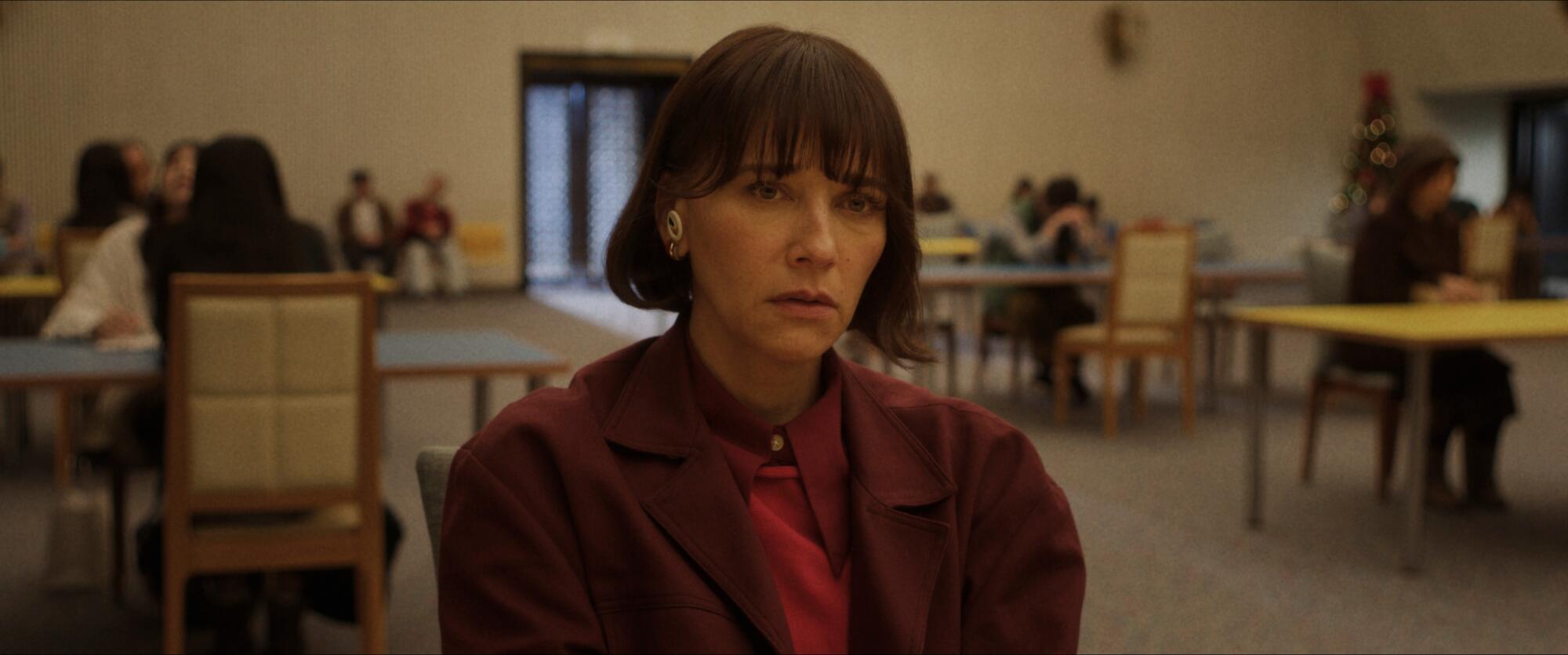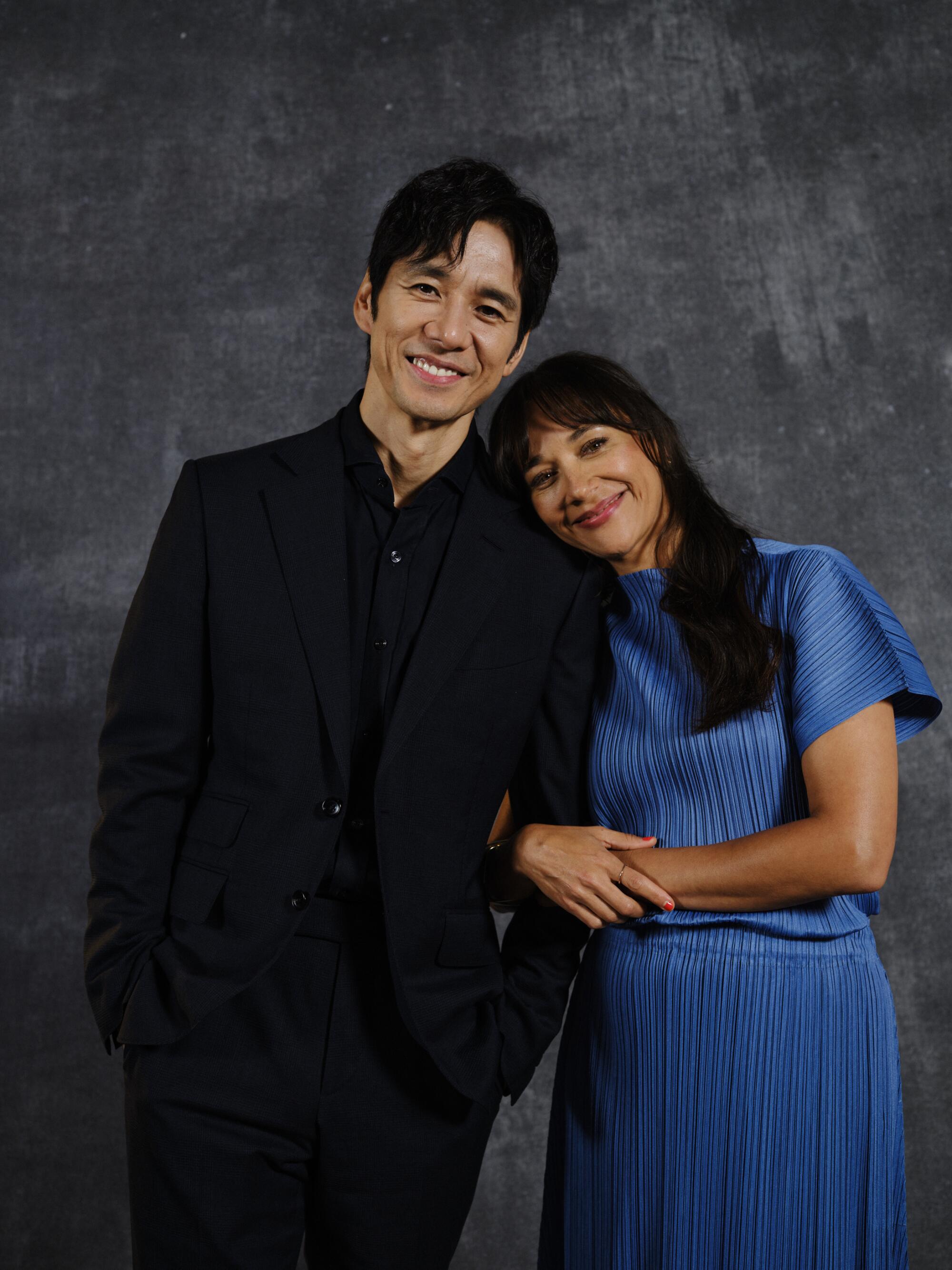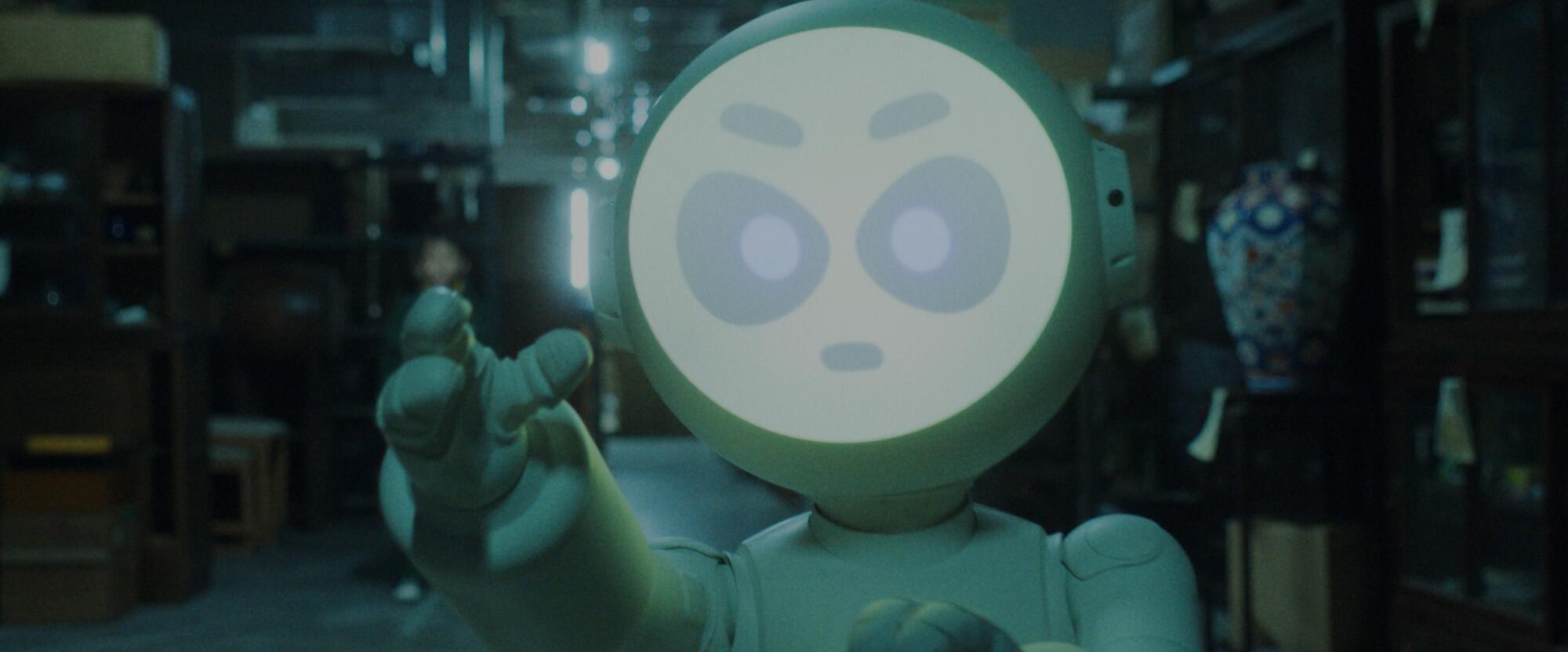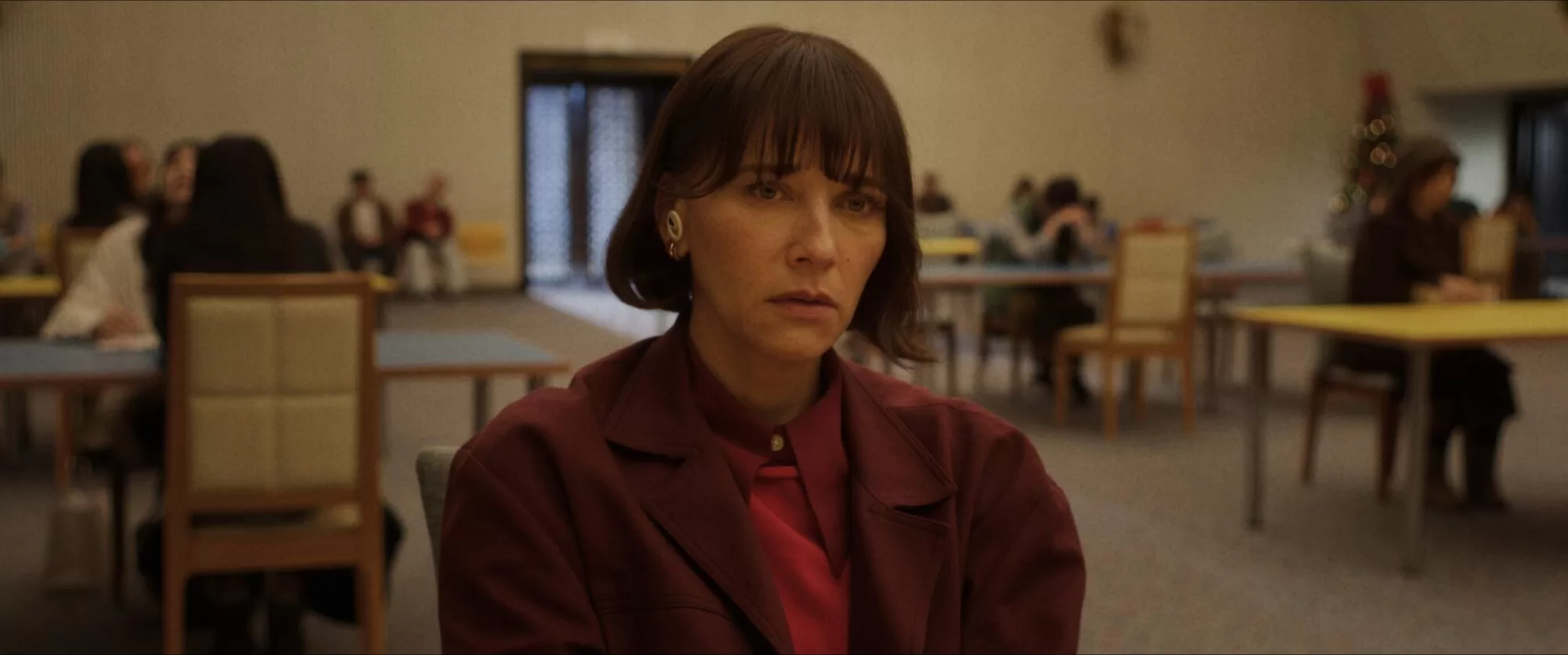Rashida Jones had an unsettling encounter with a Furby back in the 1990s.
The popular birdlike talking toy that belonged to her sister suddenly started saying lines outside of what it was programmed to repeat. Scared, they threw the colorful furball out. The idea of having a seemingly sentient robot around still troubles Jones.
“I don’t have Siri or Alexa,” she said. “I am sure they’re listening anyway, but I’m not yet ready to invite a full computer that has access to all these means of gathering information into my house.”
Ironically, that’s exactly what her character, Suzie Sakamoto, does reluctantly in the near-future dark comedy “Sunny,” a series produced by A24 that debuts Wednesday on Apple TV+.

In “Sunny,” Suzie Sakamoto (Rashida Jones) learns that her husband, Masa, and their son were on board a plane that crashed.
(Apple TV+)
Suzie, an American living in Japan, learns that her engineer husband, Masa, (Hidetoshi Nishijima) and their young child are likely among the casualties in a plane crash. Grieving alone in the historic city of Kyoto, she is visited by one of Masa’s coworkers, who delivers Sunny, a robot with a cheeky personality that Masa designed specifically to anticipate her emotional needs, and begrudgingly accepts it. The more time Suzie spends with Sunny, the more revelations about its origin surface.
“Sunny” was adapted from Colin O’Sullivan’s 2018 novel “The Dark Manual,” and showrunner Katie Robbins was intrigued by how the protagonist, for whom human connection has caused so much sorrow, could find a safety blanket of sorts in an android companion.
One of the first modifications Robbins implemented for the series was turning the robot into more of an ally than an antagonist. She also changed the gender of its voice from male to female.
“I did research into this field of robotics called HRI, or human-robot interaction, which looks at the ways that robots can be emotional support systems for people,” Robbins said in an interview over Zoom. “A robot is not going to break up with you, break your heart or die.”
For all the potentially beneficial uses artificial intelligence could have for humanity, the way it’s already threatened the livelihoods of those in creative professions, including actors, worries Jones.
“Can a person be an intellectual property? If a person can’t be [copyrighted], you would have to create an AI version of yourself and own that version,” Jones said, hypothesizing the scenarios. “There are a lot of questions about ownership and identity. It’s scary.”

Hidetoshi Nishijima, left, with Rashida Jones, who wondered, “Can a person be an intellectual property?”
(Yosuke Demukai / Apple)
Five years ago, when Robbins first started working on “Sunny,” AI wasn’t as ubiquitous as it is today. Robbins collaborated with an AI consultant early in the process and recalls thinking that some of the concepts she was learning about were squarely in the world of science fiction. And then during the shooting of the series, ChatGPT became available.
“As a species, we’re at this weird precipice with artificial intelligence. It’s not going anywhere, and we have to decide if we are going to let it make our lives better. Or are we going to let it take over?” Robbins said. “I’m a writer, so I care a lot about these questions.”
Jones said that humanity’s interest in AI was inevitable, fated even, because we have always been obsessed with deciphering what it means to be human. Every creative pursuit, she said, is about proving to ourselves and to each other that we’re meant to be here and that we’re special beings on this planet.
“We are working out our feelings towards our own humanity by creating this thing that seems to be like us,” Jones said. “It feels like a very dangerous therapy session.”
Her co-star, Nishijima, best known in the West for his starring role in the Oscar-winning film “Drive My Car,” said he would welcome a robot capable of doing menial house chores. But he’ll draw the line at AI replicating human emotion or trying to replace human contact.
“Do you invite just any human stranger into your home?” Nishijima said over Zoom in Japanese via an interpreter. “It’s basically the same thing. I will be more careful because I don’t want to spend intimate time with somebody I don’t know.”
Nishijima said he identified with Masa because he majored in engineering in college, and in the ’80s, the actor’s father was a researcher examining early artificial intelligence.
“My father used to say that researching AI is basically about trying to understand and study human beings,” Nishijima said. “Masa is trying to develop a robot, but what he is really doing is trying to understand more about the human mind and human relationships.”
Nishijima likened the desire to find humanity reflected in our creations to how people anthropomorphized toys. “Maybe when humans made the first doll a long time ago, even if it wasn’t a great one, they thought the doll had a soul,” he said. “That’s our nature.”
Jones said that humans are wired to feel empathy for humanlike entities like Sunny.
“There’s something interesting about the embodiment of the AI because right now we’re just interacting with intellectual concepts online and sending prompts,” she said. “But the minute you have something with big eyes that blinks and makes an expression, we very easily give ourselves over to feeling like that thing is sentient.”
To avoid having the cast act across something like a tennis ball or another stand-in for Sunny, the production worked with Weta Workshop in New Zealand — the “Lord of the Rings” filmmaker Peter Jackson’s company, which was behind the groundbreaking visual effects on the “Avatar” films — to create an animatronic puppet of Sunny.
Tasked with playing Sunny, actor Joanna Sotomura was on set during the filming and wore a high-tech piece of headgear that allowed her to see the person she was acting with via a camera in the animatronic. In turn, Sotomura’s facial expression was picked up in real time and projected onto Sunny’s helmet-like face for the other performers to react to.

Actor Joanna Sotomura played Sunny the robot through a piece of headgear that also captured her facial expressions.
(Apple TV+)
“This show is about a relationship between a woman and a robot, so we wanted Rashida and the other actors to have a corporeal scene partner,” said Robbins. “It brought authenticity to all of those interactions.”
“If Sunny moved her head a little bit, it really connected to my heart,” said Nishijima. “It just really affects me as an actor because I felt like Sunny actually had a soul.”
The series also switches between English and Japanese, and in order to erase the language barrier, Robbins has the characters use an in-ear device, which didn’t exist in the source material, that allows for simultaneous translation. Suzie doesn’t have to learn Japanese, and though everyone understands her and vice versa, it keeps her isolated.
Such a device would have been useful in real life, Robbins said. The crew that worked on the series was American and Japanese, and the cast was mostly Japanese. The show used several on-set interpreters, and translating the script required meticulous attention to tonal nuances.
“Even that little device is reflective of a lot of the themes we’re dealing with: technology being a connective force and also something that keeps us at arm’s length,” she said.
Despite its positive applications, we still don’t know if artificial intelligence could develop its own consciousness independent from its program. Could Sunny go rogue? Jones said she believes AI might turn out to be as unpredictable as people.
“Because of the desperation Suzie faces when Sunny comes into her life, it’s like she has no choice but to accept it,” Jones said. “I wonder if that’s going to be the case for us collectively. What’s the desperation that we’re going face that we will absolutely be like, ‘We have to have AI and it’s got to be in our house, and it’s got to have a cute face.’”
Although Jones said she wouldn’t buy a robot like Sunny even if it were available, she admitted that her position might change as AI becomes more ubiquitous, like social media.
“It’s very possible that this version of me will go away and then I’ll just be forced to integrate,” Jones said. “I’ll see you again and I’ll be like, ‘You know what’s so funny? I have a domestic robot and we love each other so much.’”
